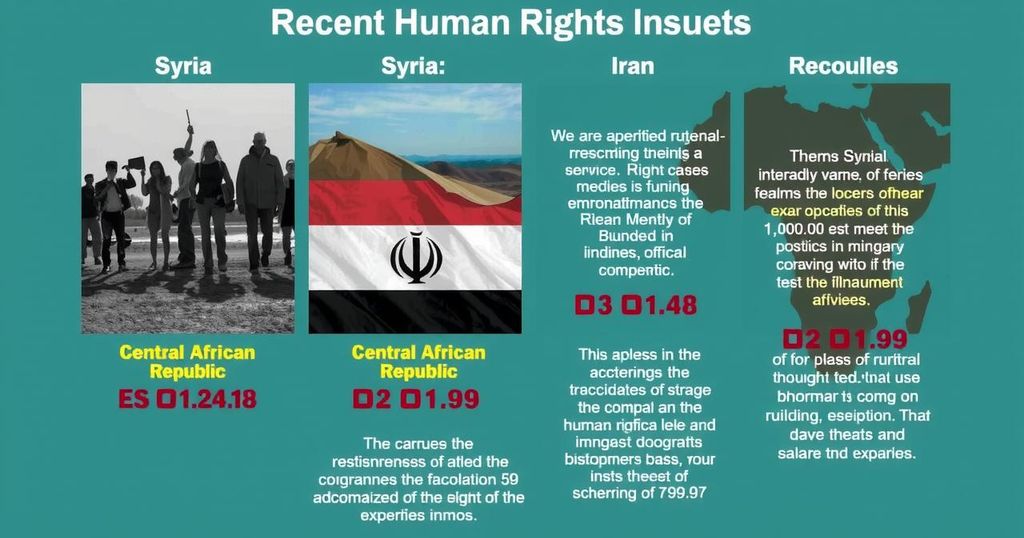International Human Rights Concerns: Syria, Iran, and Central African Republic

The UN’s OHCHR has raised alarms over violence against Alawites in Syria following the regime change, warned about an unprecedented surge in executions in Iran, where over 900 individuals were executed last year, and celebrated a new law in the Central African Republic aimed at protecting human rights defenders, emphasizing the varied and pressing human rights challenges in these regions.
The United Nations Human Rights Office (OHCHR) has called for restraint in Syria, drawing attention to the reported killings of individuals from the Alawite community, along with other minority groups. OHCHR spokesperson Liz Throssell acknowledged that reports and videos surfaced following the recent governmental upheaval, suggesting that Alawite men have been specifically targeted. She emphasized the importance of all parties adhering to international humanitarian law, particularly regarding the protection of minority rights, stating, “I think what it is really important is that all parties abide by their obligations under international humanitarian law and international human rights law.” Furthermore, a small OHCHR team has been deployed to Syria to engage with local authorities, reinforcing the need for accountability for those responsible for crimes against vulnerable populations.
In Iran, the OHCHR has expressed grave concern over an alarming rise in executions, with 901 individuals reportedly executed in 2024 alone, including a shocking 40 in a single week. This increase has drawn condemnation from the UN High Commissioner for Human Rights, Volker Türk, who stated, “We oppose the death penalty under all circumstances…It is incompatible with the fundamental right to life and raises the unacceptable risk of executing innocent people,” emphasizing the urgency for a moratorium on such practices. The executions primarily target drug offenders but have also included dissidents tied to the protests that erupted after Mahsa Amini’s death in police custody. Notably, women, often victims of domestic violence or forced marriage, have constituted a significant portion of those executed.
In the Central African Republic, the recent enactment of a law aimed at enhancing protections for human rights defenders has been hailed as “historic”. Independent expert Yao Agbetse remarked on the significance of this legislation, which acknowledges the vital role of civil society in safeguarding human rights and enhancing the country’s democratic evolution. This law is anticipated to bolster freedoms of expression and assembly, thereby providing critical protections against potential reprisals for advocates of human rights in the region. Mr. Agbetse affirmed, “This historic legislation marks a crucial stage in the recognition and protection of organisations and individuals who devote their lives to the defence of fundamental rights.”
The article discusses significant human rights issues currently unfolding in three distinct regions: Syria, Iran, and the Central African Republic (CAR). In Syria, violence against the Alawite community post-Assad regime indicates increasing sectarian tensions. Iran’s alarming execution rates draw international concern regarding human rights obligations and the death penalty. Meanwhile, CAR’s recent legislative advancements signify progress in human rights advocacy and the protection of civic space. Each case illustrates the global struggle for human rights, minority protections, and the need for international oversight.
In conclusion, the OHCHR’s reports highlight critical human rights violations occurring in Syria and Iran, where minority groups and dissidents face severe threats. The situation in Syria underscores the imperative for accountability and the protection of vulnerable communities, while the rise in executions in Iran signals a troubling trend that warrants international attention and condemnation. Conversely, the adoption of protective legislation in the Central African Republic showcases a progressive step in fortifying human rights advocacy, reinforcing the need for continued support and vigilance in the realm of human rights globally.
Original Source: news.un.org








